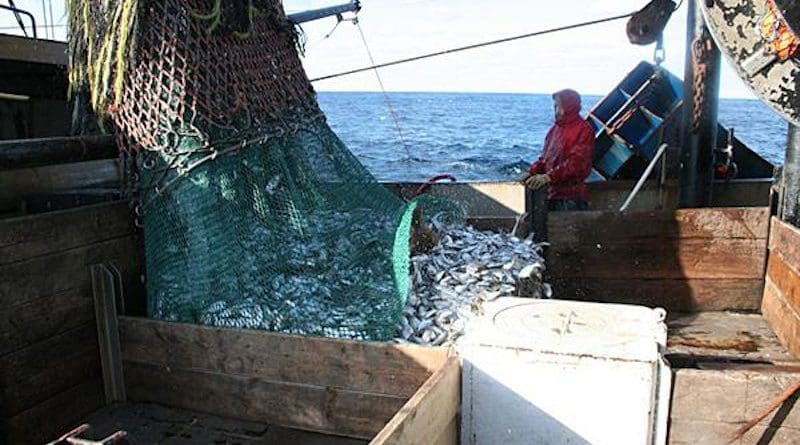Fishing In African Waters
African waters have been contributing to the global supply of fish for years, with three of the four most productive marine ecosystems in the world near the continent. African countries’ Exclusive Economic Zones (EEZs) contributed over 6 million metric tons of fish to the world’s food supply, supporting food security and livelihood in the continent, while generating $15 billion to the African gross domestic product in 2011. Every sovereign state has an EEZ, an area of ocean adjacent to their shores in which they have special rights regarding the exploration and use of marine resources.
Industrial fleets from countries around the world have been increasingly fishing in African waters, but with climate change and increasing pollution threatening Africa’s fish stocks, there is a growing concern of the sustainability of these marine fisheries if they continue to be exploited by foreign countries.
A new study used Automatic Identification System (AIS) satellite data from Global Fishing Watch to describe and characterize the spatial characteristics of African and foreign industrial fishing activities within these African EEZs. Mi-Ling Li, assistant professor in the University of Delaware’s School of Marine Science and Policy in the College of Earth, Ocean and Environment (CEOE), served as the lead author on the paper, which was published in the Fish and Fisheries scientific journal.
Industrialized foreign fishing
Countries in Africa have a short-term economic incentive to grant foreign countries access to fish in their waters. Those foreign countries have to make direct payments to acquire permits to fish in a country’s EEZ.
“There has been controversy over foreign fishing in African waters, but there hasn’t been a quantitative assessment of how they act,” said Li. “It’s difficult because a lot of the African countries do not have good surveillance of their fisheries.”
The study described spatial and temporal characteristics for both African and foreign industrial fishing activities — examining boats that were large enough to carry AIS trackers.
“African fisheries desperately need better information and data for management,” said David Kroodsma, Director of Research and Innovation at the Global Fishing Watch and a co-author of the paper. “It is exciting to be able to use vessel GPS data to help solve this challenge and reveal fishing activity across the continent.”
The paper highlights where and how long the boats spent most of their time and what fish they reported catching in those locations.
The EEZs fished by a large number of countries were generally located in West Africa, with the EEZs of Western Sahara and Mauritania fished by the highest number of foreign countries.
The resources of specific fish stocks could determine where vessels would fish. Vessels from Japan, for instance, spent most of their time fishing in eastern Africa for tuna, with an estimated 75% of total reported Japanese catches coming from the waters of Madagascar, Mauritius, Mozambique, and Seychelle.
“This paper shows that fisheries and their management in Africa are globally interconnected, highlighting the need for international cooperation to address the challenges that fisheries in the continent are facing,” said William Cheung, professor at the Institute for the Oceans and Fisheries at the University of British Columbia who is a co-author of the study. “We demonstrate the importance of having accessible data, including those from new technology, to generate knowledge that is necessary to address these challenges.”
One puzzle piece
While the AIS data can show where and how long the vessels were fishing, there is a reliance on the reporting data from the vessels themselves to confirm what they are catching. Sometimes, the data does not always correlate, pointing to the possibility of illegal, unreported or unregulated (IUU) fishing.
The study used Namibia, an African country in that region, as a case study.
Unlike some other African countries, Namibia requires fleets in their EEZ to land their catches in their domestic ports. Not all fishing fleets followed that regulation, however. While 20 fishing entities were identified by AIS as being in Namibian waters, not all of the vessels recorded having caught fish in those waters.
“Namibia has a relatively good surveillance system, and they require every fleet who fishes there to land in their docks,” said Li. “But even with those regulations, we find a big discrepancy in who reported fishing and catch there and who we detected by AIS. This is a big issue with regards to illegal fishing in African waters.”

